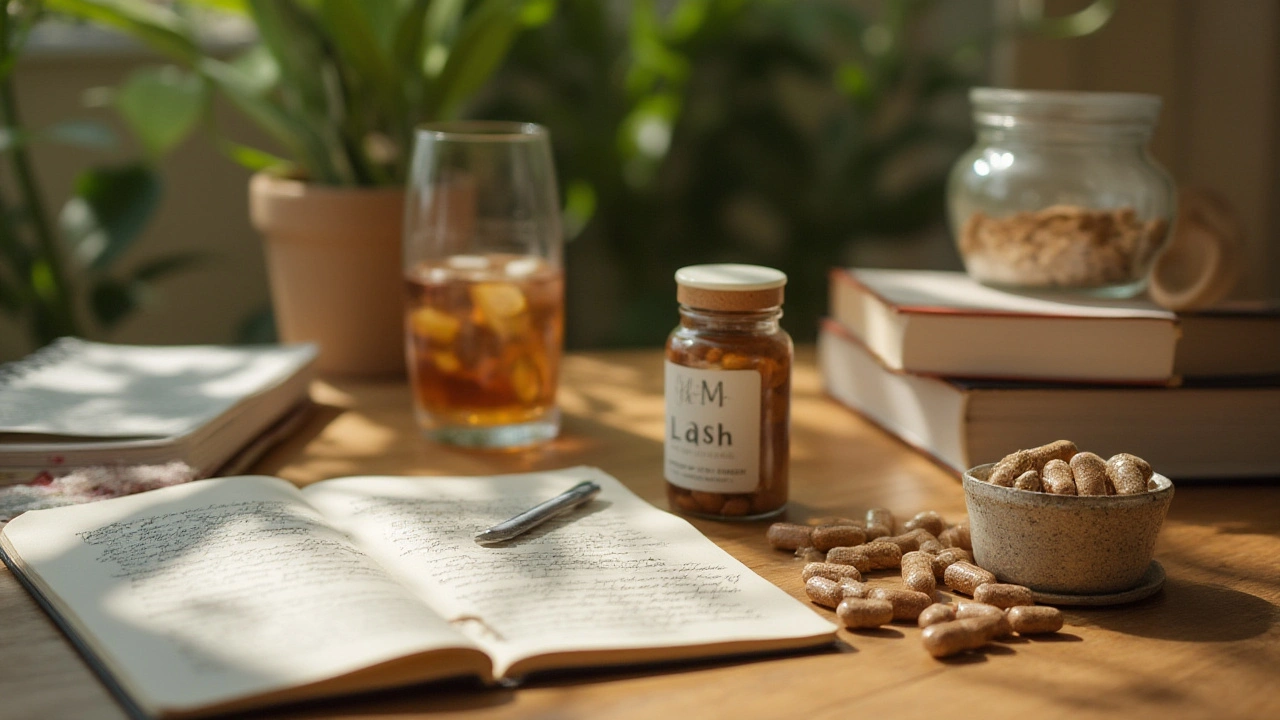If you think your morning energy levels just aren’t cutting it, or the stress of juggling daily life drags you down, you’re definitely not alone. There’s a new contender people are buzzing about—and it’s got a strange name that’s tougher to pronounce than most vitamins at your local store. Meet the ash dietary supplement. Used for centuries but only exploding into mainstream shelves in the past decade, this herbal powerhouse has been keeping people curious, optimistic, and, importantly, feeling good. Sounds like hype? The surge in wellness interest isn’t just smart marketing or internet fads. Some serious science and tradition back up this humble root’s reputation.
What is the Ash Dietary Supplement?
Let’s break things down without confusion: The term "ash" usually points to Ashwagandha, a plant native to India and North Africa, celebrated as an adaptogen. This means it might just help your body manage stress. The root is ground into powder and turned into capsules, teas, or drink powders. But what sets ash dietary supplement apart from the usual lineup of vitamins and minerals in your kitchen?
The hype isn’t just about a calming vibe. Ash is rich in withanolides, which are natural compounds that support brain function, immune health, and even stamina. Records go way back—texts from 6000 years ago in Ayurvedic medicine mention its mood-balancing abilities. Modern supplements are mostly made from the root, carefully powdered and tested for heavy metals, mold, and potency for those with quality in mind.
You might have seen brands touting "KSM-66" or "Sensoril"—these are just trademarked forms that prove consistent concentrations of what actually makes ash work. A key fact? Not all supplements are created equally, and the standardization on the label is something worth checking before dropping money on a bottle. If possible, check it’s third-party tested, which helps avoid fillers or other sketchy extras. No one wants a mystery pill.
Another win: ash blends right into daily life. Sprinkle it in a smoothie or stir the powder into yogurt. Capsule folks, you’re covered, too—just swallow with water. The earthy, slightly bitter flavor isn't everyone's cup of tea (or, let’s be honest, anyone’s at first)... but blending with bold flavors masks it well.
Ash Dietary Supplement: The Science and Studies Behind the Claims
Any supplement can promise the stars. What about real studies and honest-to-goodness results? University research in the last 20 years has dug into ash's effects—and some findings are genuinely surprising.
One double-blind study published in the Indian Journal of Psychological Medicine (2012) showed a 44% reduction in stress levels and lower cortisol (the “stress hormone”) in healthy adults after 60 days of ashwagandha root extract. That’s not placebo level; that’s a statistically solid difference—good news if you feel like your nerves are permanently frazzled. Even more, additional research (JANA, 2008) found improved mood, better sleep, and higher sense of well-being after taking 300mg twice a day. This makes sense considering its traditional use for insomnia and anxious tension.
But it goes beyond just calming nerves. Sports science labs have tested ashwagandha for boosting muscle strength, endurance, and even speeding up recovery. In a 2015 study in the Journal of the International Society of Sports Nutrition, men who took the supplement for eight weeks while doing resistance training gained more muscle size and improved their bench press and leg extension compared to the placebo group. Ash seems to support the body’s ability to adapt—and isn’t that what we all want when life throws us curveballs?
Even the brain gets a piece of the action. Early evidence hints at sharper memory, quicker recall, and reduced brain fog—things you notice when balancing tough projects or study sessions. That’s likely due to a combination of less anxiety, better sleep, and some direct impact on neurotransmitters (the brain’s chemical messengers). Nothing is magic on its own, but the stacking of proven benefits makes it easy to understand the growing demand.

Daily Benefits You Can Actually Feel
Let’s zoom in: What does ash actually do once it lands in your routine? People report different effects, but a few common threads keep popping up.
- Steadier energy all day. This isn’t the jittery boost of caffeine or the crash of sugary snacks. It’s more like a background upgrade—your get-up-and-go is steady and reliable, not frantic.
- Calmer under pressure. Noticeable feedback? People working in high-stress jobs talk about less “snapping” at minor hassles. Parents juggling kids and deadlines feel more patient. That mental buffer is gold.
- Smoother sleep. Whether you struggle with falling asleep or wake up tired, regular use has helped plenty turn the corner. It doesn’t knock you out like a pharmaceutical, but stress lessening and mood balancing can help you relax for real rest.
- Better focus. With less background anxiety and fatigue, your attention for work or studying can sharpen. Fewer silly mistakes, stronger recall, more stuff done in less time.
One thing you won’t find? Instant miracles. Ash is subtle, especially in the beginning. Most folks start to notice real improvements after a week or two of daily use. Some users mention feeling happier, more optimistic, or less emotionally up and down. Others note reduced post-exercise soreness or faster workouts—even if they’re just squeezing in ten minutes with resistance bands at home.
Here’s a hack worth trying if you want to maximize effects: pair ash supplements with healthy routines. Regular sleep, balanced meals, hydration, and consistent workouts amplify the benefits. Ash isn’t a shortcut for a junk food binge or all-nighters cramming for exams. But as a solid support tool? That’s real-life, science-backed enhancement with daily payoff.
Best Practices, Dosage Suggestions, and Safety Tips
This isn’t your buddy’s mysterious gym powder—ash has safety and dosing guides to respect. Most clinical trials use 300–600mg per day of a standardized extract (check the bottle for "root extract" and percentages like "5% withanolides"). Some people spread that across morning and evening; others take the full amount after breakfast. Start with the lower end, especially if you’re sensitive to supplements or medications.
Consistency is king. Unlike caffeine, where a single cup delivers an instant jolt, adaptogens need steady intake over weeks to stack up full effects. Want smoother sleep or focus? Take your last dose a few hours before bed—no need for late-night nerves. If you’re mixing powders into food, use strong flavors (think chocolate protein shakes or spicy stews) to hide the earthy aftertaste.
- If you’re already taking medication or have health conditions (like thyroid disorders), check with your doctor. Ash can interact with thyroid hormones, anxiety meds, or blood pressure treatments.
- Pregnant or breastfeeding? Skip ash, just to be safe. Research here is limited.
- Stick to trusted brands. Look for third-party certifications: NSF, USP, or ConsumerLab. These back up what’s on the label—and keep heavy metals, microbes, or weird fillers out.
- Watch for side effects. Though rare, some users get mild stomach upset or diarrhea, especially with high doses or taking it on an empty stomach.
Everyone’s biology is different. Track your own results, and if you don’t notice improvement in three or four weeks, review your routine. Maybe another adaptive supplement suits you better, or lifestyle tweaks are needed to move the needle.

How to Pick the Right Ash Supplement and Fit It Into Real Life
Walking down the supplement aisle or scrolling online can get overwhelming fast. There are powders, capsules, tinctures, and even gummies now—all claiming “purest” or “best” formula. Here’s how to narrow down the smart choices:
- Check for full-spectrum, root-only products. Leaves and stems contain fewer active ingredients, so root extract packs the most punch.
- Look for standardized labels specifying withanolide content. That’s what most studies use, and it’s the active part.
- Opt for third-party lab certification to avoid adulterated or low-quality stuff. No one wants to gamble with their health.
- If you’re vegetarian or vegan, verify the capsule shell. Some brands sneak in gelatin, so plant-based shoppers should confirm ingredient lists.
There are tricks for fitting ash into your day so it actually sticks. Swallow capsules right after breakfast for energy and calm heading into your workday. Stir powder into a post-workout shake, or blend with honey for a quick afternoon reset. Some people bake it into protein balls or bars—great for meal preppers and snack lovers.
You can stack ash with other adaptogens, like rhodiola or holy basil, for different wellness angles—just tweak doses and keep notes on how you feel. Too much, too soon? Ease back. And don't chase shiny trends. A smart, steady routine beats a jumble of random pills you never remember to take.
At the end of the day, small, daily tweaks add up. Ash dietary supplements won’t change your life with one serving, but steady use and a little patience could unlock a steadier, calmer, and more energized you. All you need is a willingness to experiment, focus on trusted brands, and give yourself two or three weeks to truly feel the results. This isn’t hype—this is the slowly growing wellness revolution you didn’t know you needed.


Jonah Thunderbolt
July 23, 2025 AT 03:47Rebecca Price
July 23, 2025 AT 06:37shawn monroe
July 23, 2025 AT 08:26marie HUREL
July 23, 2025 AT 14:18Leo Adi
July 23, 2025 AT 20:53Melania Rubio Moreno
July 25, 2025 AT 12:51Gaurav Sharma
July 26, 2025 AT 21:05Shubham Semwal
July 26, 2025 AT 22:22Sam HardcastleJIV
July 28, 2025 AT 09:15Mira Adam
July 28, 2025 AT 22:46Miriam Lohrum
July 30, 2025 AT 11:54archana das
August 1, 2025 AT 07:04Emma Dovener
August 2, 2025 AT 08:26Sue Haskett
August 3, 2025 AT 10:41Jauregui Goudy
August 4, 2025 AT 02:01Tom Shepherd
August 4, 2025 AT 18:24Rhiana Grob
August 4, 2025 AT 23:25Frances Melendez
August 5, 2025 AT 05:15